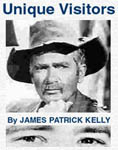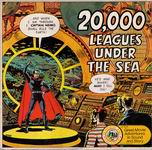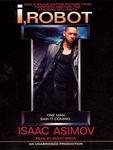
 Unique Visitors
Unique Visitors
By James Patrick Kelly; Read by James Patrick Kelly
FREE MP3 DOWNLOAD (link to jimkelly.net) – 15 Minutes (7.11 MB) [UNABRIDGED]
Publisher: www.jimkelly.net
Published: April 2004
Themes: / Science Fiction / Time Travel / Immortality / Internet / Personality Uploading /
Submit query. There are currently 842 unique visitors monitoring this session. The average attention quotient is 27 percent. Twenty-seven percent! Don’t you people realize that you’ve got an eyewitness to history here?
Afraid to die? Want to watch reruns of The Beverly Hillbillies for all eternity? All you have to do is give up your body. Even better you can visit the future throught the miracle of forward time travel, just set your alarm clock for a million or so years and turn yourself off.
First published in the hardcover anthology Redshift: Extreme Visions of Speculative Fiction (2001), the short story “Unique Vistors” takes its name from the term for webpage hits and posits a future where you are you can become your own webpage! Full of wry humor, nostalgia, philisophical insight, and internet savvy, this the prototypical James Patrick Kelly tale.
Told in the first person, what would have been an otherwise straightforward performance by Kelly is accented and enhanced with electronica music, echoing voice effects and canned laughter. I’m not sure the canned laughter or the echoing voice work – but I liked the techno music and the sound quality and production values were good. As with the all the other audio stories of Kelly’s we’ve reviewed, “Unique Visitors” is available for download on Kelly’s website for FREE – become a unique visitor, try it yourself! Kelly only asks that if you enjoyed hearing the tale you consider making a donation to his PayPal account. Donate as little or as much as you like, but seriously consider giving him a little something – after all, its in our own interest – because if we do he’ll give us more stories like this!
Posted by Jesse Willis


 Hitchhiker’s Guide to the Galaxy: Live in Concert
Hitchhiker’s Guide to the Galaxy: Live in Concert

